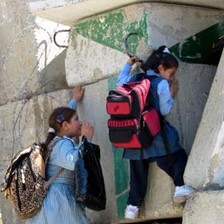East Jerusalem 6 April 2003
Between walking among the lands in Qalqiliya, which Israel is confiscating for the so-called ‘security barrier’, and visiting the hospital where Jihad, a fourteen year-old martyr who was shot by Israeli ‘special forces’, was prepared for his funeral, one can easily understand why the residents of this caged city state there is an internal closure on their spirits. Threats from Israeli forces come as they attempt to work on what little land they have left and from undercover units carrying out operations and assassinations in their streets and homes.
Last Wednesday the air was hot and difficult to breathe in Qalqiliya as Rzq and his uncle Khalid told me about the land their family is loosing to the wall. Before the Intifada they had seven dunums of cropland which their family farmed; this is from an original fifty dunums they owned before 1948. It was difficult to hear their voices sitting on their last two dunums as bulldozers tore up the ground less than thirty meters away. Since November 2002 they, as all the farmers in Qalqiliya, are threatened daily by Israeli military and private ‘security’ forces when working on their land which has not been confiscated.
The men invited me to visit their land which will be isolated between the wall and the 1967 Green Line; rendering it inaccessible to them. Two private Israeli security officers arrogantly stopped us as we walked over the destructed land and past the bulldozers. They asked where we intended on going and forced Rzq and Khalid to show their ID cards, then after a few questions let us pass. “Usually they are not so brief with us…must be because there is an international,” Rzq remarked. The statement reinforced how such incidents can undermine Palestinians’ right to access their land because it is their land, with or without international presence.
I asked Khalid how often he had faced threats and orders to leave his land. “Well over a hundred,” he replied, and then added, “They opened fire at me twice when I kept working.”
On the confiscated land, full of olive and lemon trees, we were joined by Ebrahim who had built a house on the neighboring plot of land fifteen years ago. While he has an apartment in the city, he described this house as once the only place he could imagine living because it was on his land. One can see the two-room home was once picturesque; it’s surrounded by citrus trees with a stone path leading to a groundwater well and Ebrahim tiled the interior and installed a pluming system himself. Six months ago the home was ransacked by the Israeli military in order to deter him from working his land and to leave permanently. Staring at the house, which is less than twenty-five meters from the wall’s path, the thee men recollected about past times working side by side on the land, relaxing afterward over tea, and selling their produce throughout the West Bank’s markets.
Rzq and Khalid spoke little about what they expect to happen after the wall permanently prevents them from reaching their land. While they visit their confiscated lands, they have been forced to stop harvesting most crops. When we returned to their remaining two dunums of land it occurred to me that no ‘buffer zone’ had been razed on either side of the wall’s path. In parts of Qalqiliya where the wall is finished the buffer zone is about 50 meters wide; their land was exactly next to the wall’s path meaning that Israel is likely to confiscate more. Rzq told me that they had yet to receive any confiscation orders and “All we say is that God will help us so that they [Israelis] will let us stay in our homes even.”
Rzq’s statement caught my attention as I recalled how Suher al-Hindi was shot through the window of her home last fall during an Israeli ‘special forces’ operation. The residents in Qalqiliya regularly experience shooting through the windows of their homes and on their streets from Israeli undercover units carrying out assassinations and arrests. The previous night Jihad Abdulatiz Nezal, fourteen years old, was killed in front of his home during such an incident.
Just after midnight on Wednesday April 2nd Israeli forces entered Qalqiliya in order to capture two ‘wanted persons.’ While they were forcefully entering a home where these individuals lived Jihad opened his door, across the street, in order to see what was causing the commotion. He was immediately shot four times by Israeli forces.
I was in the hospital Thursday morning talking to employees about the rise of emergency care in Qalqiliya during the intifada. Two individuals informed me about Jihad’s death and asked if I wanted to see what grievances they dealt with regularly. I knew what this entailed and doubted whether I should go; but I chose to follow because the individuals wanted me to understand a part of their work, their lives, which I have no experience with. Doctors were in the process of cleaning Jihad’s young body when we entered the sterile room. He had been shot once in his chest, which by the wound’s size obviously tore away any chance for survival, and three more bullets ran down to the left side of his body…I was outraged and staggered by the reality that here was a young boy who had looked out the door of his home last night and was shot by occupying soldiers. There was no further need for the doctors to discuss their difficulty in handling the increase of deaths in Qalqiliya.
Robyn Long is a graduate student completing a one year Compton Fellowship in Palestine where she has been visiting rural communities throughout the West Bank and volunteering for Palestinian organizations.


